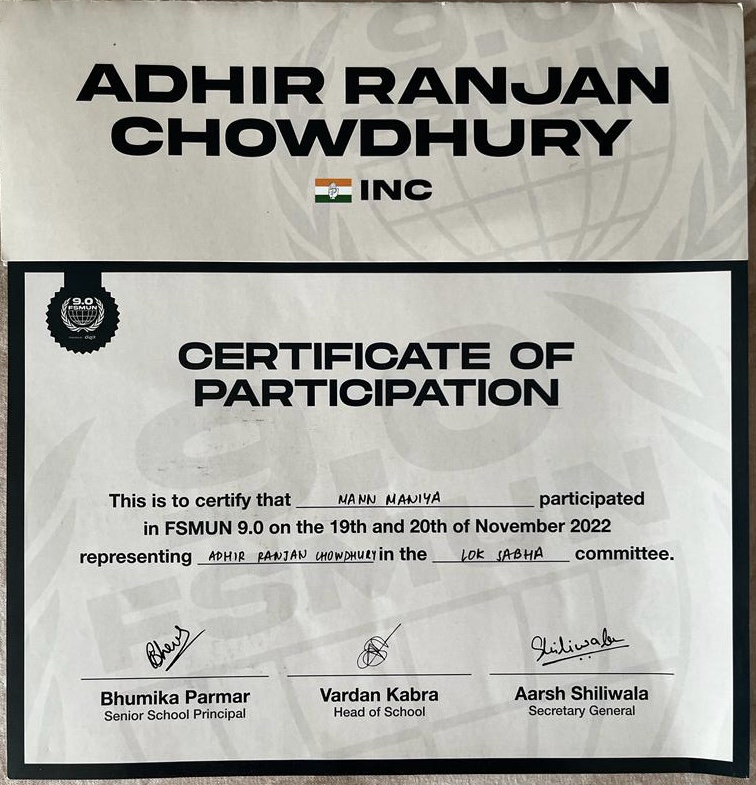FSMUN, was a Model United Nations conference I participated in as Adhir Ranjan Chowdhury, in the Lok Sabha committee. The agenda for the MUN was to address disputes in Northeastern India. This was an opportunity for me to engage in a simulated UN experience, to research and debate on the current issues facing Northeastern India and to develop my skills in diplomacy, public speaking and problem-solving. Through this MUN, I had the chance to represent the views of Adhir Ranjan Chowdhury and engage in intense and thought-provoking discussions with other delegates. It was an enriching and valuable experience that allowed me to learn more about the current situation in Northeastern India, as well as develop my skills in research, diplomacy and public speaking.
LO1: Identify your own strengths and develop areas for personal growth
In Model United Nations (MUN), research and observation skills are crucial in preparing and presenting arguments effectively. My strength in research enabled me to conduct thorough research on the topics discussed in MUN sessions, which provided me with a solid foundation for my arguments. Additionally, my observation skills allowed me to analyze and understand the perspectives and arguments presented by other delegates, helping me counter their arguments effectively. However, I struggled with debate skills and public speaking. In MUN sessions, delegates are expected to present their ideas convincingly and persuade others to support their positions. My lack of strong debate skills and poor public speaking abilities hindered my ability to do so effectively. I found it challenging to articulate my thoughts clearly and persuasively, especially when speaking in front of a large audience.
LO2: Demonstrate that challenges have been undertaken, developing new skills in the process
As a delegate in the FSMUN conference, I demonstrated that I had undertaken the challenge of representing the views of Adhir Ranjan Chowdhury in the Lok Sabha committee and addressing the disputes in Northeastern India. This required me to conduct extensive research on the current issues facing Northeastern India and to develop my knowledge on the topic. Through the simulation of a UN experience and the intense and thought-provoking discussions with other delegates, I developed new skills in diplomacy, public speaking and problem-solving. I had to think critically and communicate effectively in order to advocate for my position and negotiate with other delegates
LO5: Demonstrate the skills and recognize the benefits of working collaboratively
As a delegate in the FSMUN conference, I had the opportunity to demonstrate my skills and recognize the benefits of working collaboratively. In the Lok Sabha committee, I had to work with other delegates to find solutions to the disputes in Northeastern India. This required me to actively listen to the perspectives and ideas of others, while also effectively communicating my own views. Through collaboration, we were able to generate a range of potential solutions and evaluate the different options. Working collaboratively also allowed me to develop my negotiation skills, as I had to find common ground and compromise with other delegates to reach a resolution. Additionally, being part of a team also provided me with support and constructive feedback, which helped me to improve my research and public speaking skills.
LO6: Demonstrate engagement with issues of global significance
As a delegate in the FSMUN conference, I demonstrated engagement with issues of global significance by addressing the disputes in Northeastern India. This issue is of global significance as it relates to the human rights and self-determination of indigenous people in Northeastern India, as well as the impact of these disputes on regional stability and security. Through my research and participation in the simulation, I gained a deeper understanding of the complexity of the issue and the various factors that contribute to it. During the MUN, I had the opportunity to engage in discussions with other delegates representing different parties, allowing me to gain a broader perspective on the issue and to consider different solutions. Through this, I was able to see the global significance of the issue and how it affects not just Northeastern India, but also the international community as a whole. In addition, I also had the opportunity to propose solutions and engage in negotiations with other delegates to find a resolution to the disputes. This helped me to understand the importance of global cooperation and diplomacy in addressing such issues.
As a delegate in the FSMUN conference, I had the opportunity to demonstrate my skills in diplomacy, public speaking, problem-solving, research, and negotiation while addressing disputes in Northeastern India. I engaged with an issue of global significance, gaining a deeper understanding of the complexity of the issue and its impact on regional stability and security. Through collaboration with other delegates, I also recognized the benefits of working collaboratively and the importance of international cooperation and diplomacy in addressing such issues. Overall, the experience was challenging and valuable, allowing me to develop new skills and gain a broader perspective on the issue.

